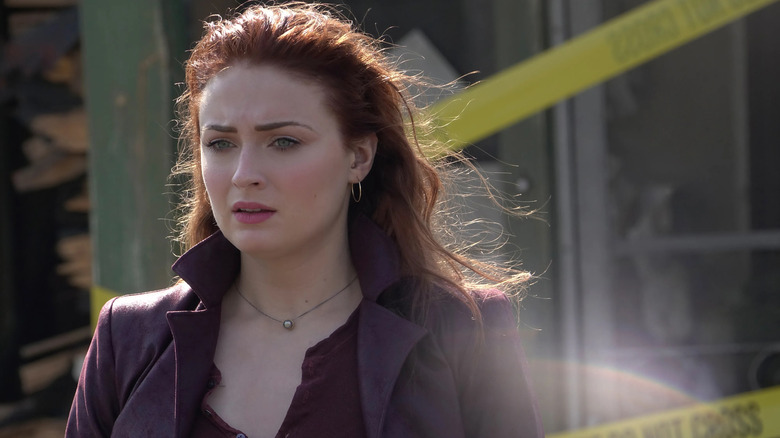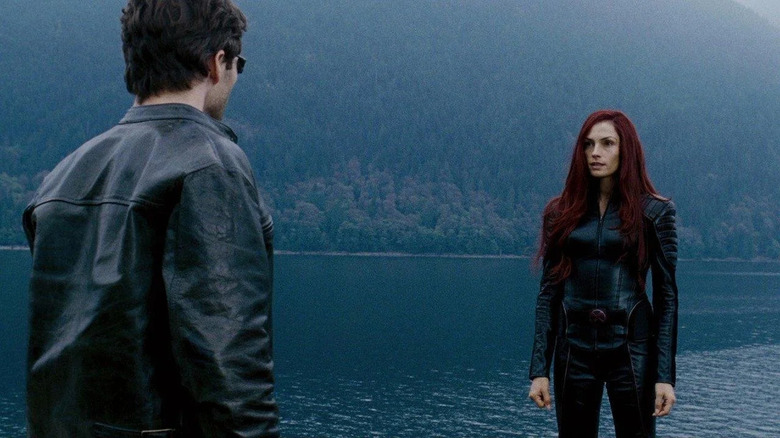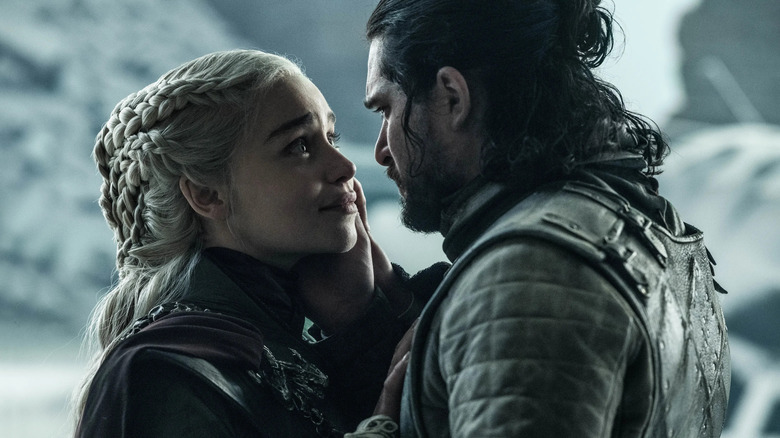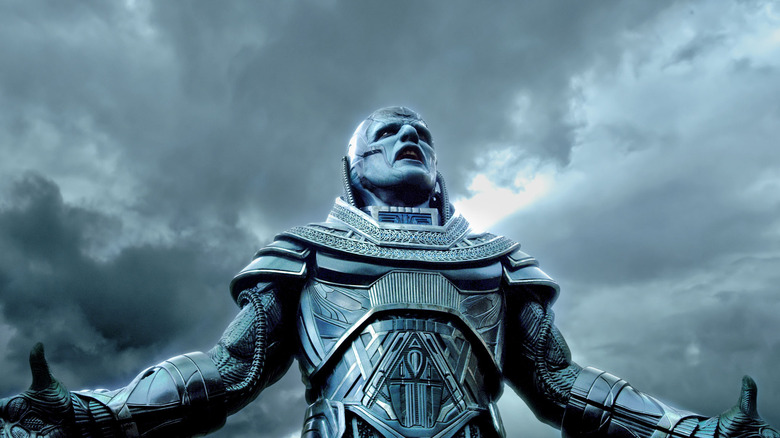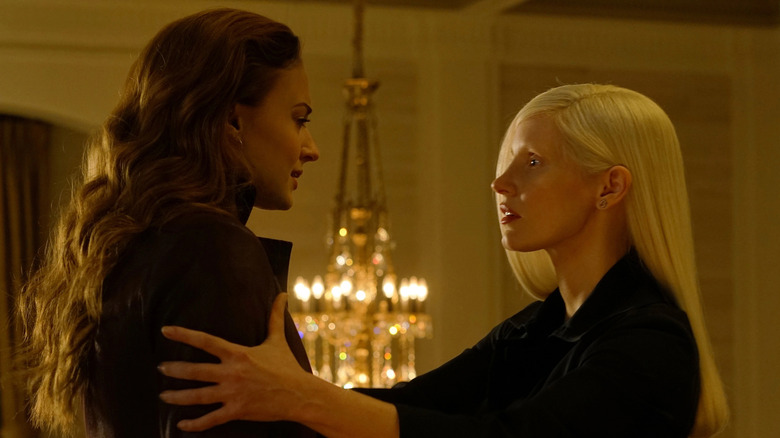Why X-Men: Dark Phoenix Was A Box Office Flop
Get our hopes up with a Dark Phoenix storyline once? Shame on you. Get our hopes up with the storyline twice? Shame on us.
Of course, if the box office returns were any indication, nobody actually got their hopes up for a Dark Phoenix-themed X-Men movie the second time around. The movie came and went with poor reception from audiences and critics alike, serving as the final nail in the coffin for this particular string of "X-Men" movies. Not only did the movie perform poorly by every metric available, but nobody seemed particularly surprised by its performance either, which begs the question: what exactly was it that soured us on the movie before it even hit theaters?
The X-Men are some pretty popular characters, after all, played by plenty of beloved actors like Michael Fassbender and James McAvoy. "Dark Phoenix" also starred Sophie Turner just off the heels of the final season of "Game of Thrones," and centered around a story arc that's one of the most famous and respected in comic book history. On paper, at least, this film should've had a lot of hype behind it. So why was it such a flop?
When in doubt, blame The Last Stand
"The Last Stand" was the first X-Men movie to nearly kill the franchise, but it wouldn't be the last. After a solid opening film and an even better "X2," this third film came along and stomped on everything that made the X-Men movies great. Did you come to like familiar characters like Cyclops, Rogue, Nightcrawler, Mystique, or Professor X? Well, here they're all either callously killed off, clumsily written out of the story, or they've straight-up vanished from the face of the earth, never to be mentioned again.
But the biggest issue with the movie is the way it tries to cram together two major storylines that didn't fit. The whole mutant cure storyline could've been fascinating, but the movie never seemed interested in unpacking the implications of it too deeply. Meanwhile, the Dark Phoenix saga in the comics is famous for being a sprawling, slow-burn story, yet "The Last Stand" felt perfectly comfortable making it this film's B-story. The fact that "The Last Stand" is also 30 minutes shorter than "X2" (for some reason) definitely didn't help.
Most damning, perhaps, is the movie's treatment of Jean Gray (Famke Janssen), who is given a bafflingly passive role in a movie that is supposedly about her. In the comics, her arc ends with her making the active choice to end her life for the greater good. The arc finishes with the famous quote, "Jean Grey could have lived to become a god. But it was more important to her that she die ... a human." In the movie, the choice is handed over to Logan, who kills her for her own good while telling her he loves her.
A familiar, problematic trope
If you've read and watched a lot of fantasy and science fiction, the resolution to Jean's storyline in "The Last Stand" probably feels familiar. It was also the culmination of Daenerys' arc in the final season of "Game of Thrones." The woman goes mad with power, so her male love interest has no choice but to lure her into a false sense of security and heroically murder her for the greater good. Neither Daenerys in the show nor Jean in "The Last Stand" get to be interesting, compelling characters in their final moments; they're just the final obstacle for the male protagonist to overcome.
Even in well-written stories that treat female characters with respect, similar arcs are common. "Avatar: The Last Airbender" culminates the side-villain Azula's storyline by having her lose her sanity just as she's getting everything she's said she wanted. Carrie White from "Carrie," although written with plenty of compassion, still goes mad with power and needs to die for the story to be complete.
A work of fiction isn't inherently bad because it includes this sort of trope, but it certainly can be frustrating and can come across as lazy or offensive. And for moviegoers in June of 2019, the "Game of Thrones" finale was only a month ago; they'd just finished watching the culmination of quite possibly the worst example of the trope so far. Why would we want to watch an X-Men movie where we already know the gist of what will happen to Jean, and where we know going in that it'll probably be just like another lackluster franchise finale from a few weeks earlier?
If still in doubt, blame Apocalypse
If scapegoating "Game of Thrones" seems too easy, however, you can always just blame "X-Men: Apocalypse." Whereas "First Class" successfully rebooted the franchise and "Days of Future Past" was a thrilling follow-up adventure, nearly every writing choice made in "Apocalypse" was the wrong one.
The ending to "Days of Future Past" seemed to be setting up a return to the present-day timeline, one where characters like Jean and Professor X are still alive. So, it seems particularly weird for the next movie to introduce us to another version of Jean Gray as a teenager in the '80s, whose storyline is filled with contradictions from the original trilogy.
"Apocalypse" at least puts a little more effort this time around into establishing Jean as a prominent character before her Dark Phoenix arc, but it doesn't succeed. The movie is far too cluttered for its own good, and Jean is forced to compete for screen time against a dozen other characters with their own poorly-written storylines.
After multiple "X-Men" films with world-ending stakes, the series really could've benefitted from a quieter, more grounded movie where we got to watch the new teen characters get to know each other and fully come into their own as both heroes and young adults. It should've been a movie like "Spider-Man: Homecoming," where the stakes were only really high on a personal level, but instead, they went for another over-the-top supervillain who needed to outdo all the other over-the-top supervillains the X-Men had already defeated. The world can't be ending in every X-Men movie; after a certain point, it just feels boring.
It's barely even Dark Phoenix's fault
Beyond the writing of Jean, most of the other characters in "Apocalypse" feel strangely tired and lifeless. Magneto in particular is given a lazy, long-winded subplot that just repeats all the same beats we've come to expect from the character. Jennifer Lawrence, who was great in the first two films as Mystique, suddenly feels bored in the role, although maybe that's because the writers don't give her anything interesting to do. The only moment where the movie feels alive is with Quicksilver's return, but even he is not as exciting this time around. This movie has an unintended message that rings loud and clear: this franchise has lost its spark.
By this point, "Dark Phoenix" probably wouldn't have been a huge success even if they'd nailed the storyline, or even if they'd switched gears early on and made the movie about something completely different. The fact that "Dark Phoenix" didn't nail it, the fact that it was plagued by reshoots and resulted in a boring, lifeless final product, was the last nail in the coffin for the "X-Men" franchise, at least as long as 20th Century Fox was running it. Sophie Turner's Jean Gray got to be far more of an active character than her original trilogy counterpart, but that couldn't stop the movie from feeling like a rehash.
It's not so much that "Dark Phoenix" killed the series, but that it failed to bring it back from the dead. If the Marvel Cinematic Universe ever gave these X-Men movies a thorough autopsy before figuring out their own approach to the characters, they'd have found that "The Last Stand" and "Apocalypse" hold the most valuable information. In terms of lessons for what not to do, these films are a gold mine.
